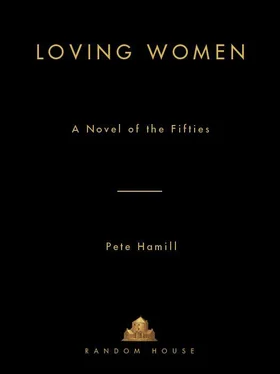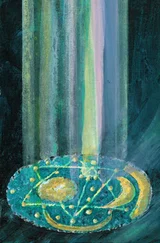In the spring she taught me the names of the world. She named the trees in the swamps, mostly cypress and tupelo, and the great hardwoods in the bottom land, oak and sweetgum, hickory, magnolia and red maple. I’d pluck leaves from each new tree, discovering that I could always draw a tree if I followed the basic structure of the leaf. In the higher land, she showed me the difference between slash pine and longleaf pine, and the dogwood and wax myrtle that grew at their base, and sometimes we would just sit there in the stillness and she’d point out warblers and woodpeckers and we’d close our eyes and hold each other and listen to the soughing of the wind through the longleaf pines.
One Sunday we drove west on route 98, hugging the sparse coast until we ran out of road. We moved inland then on a two-lane blacktop and parked the car under some live oaks hung with moss. We carried a picnic basket deep into the woods. When we were out of sight of the road, we heard a snapping sound and saw a white deer scamper away, and then Eden pointed out a possum and the tracks of a bobcat. “There’s prob’ly some black bear in here too,” she said. “Now they could kill ya … But not to worry, they been most hunted off.”
The woods had a deep loamy smell that seemed to enter her, slowing her movements, making her more languorous, her voice more raw. She took my hand and made me bend under low-lying branches, then shoved me away from a pile of leaves (“Copperheads love them leaves”) and made me walk around a fallen log (“That’s where the cottonmouths live”) and laughed at my city ways of walking and told me the names of the bugs: ticks and fire ants, chiggers and deer flies and black flies all mixed up with the mosquitoes and the no-see-ums. If you got a tick under your skin she said, patiently, quietly, you had to smother him, cover him with nail polish, force him to fight his way back out. Chiggers made a little tube under the skin and you had to scrape them away, tube and all, gouging them right off the surface. “Chiggers love the leaves too,” she said. “Best thing you can say about a copperhead is they eat the chiggers …”
Just knowing the snakes were around made me feel creepy. But Eden talked about them in a casual way. “There’s hardly any rattlers around here anymore,” she said. “Nobody knows why. They just moved away, went someplace else.… Coral snakes could hurt you a little. They’re tiny things, a real pretty color, but you’d have to be tryin to kiss one for it to do you any damage. The cottonmouth, well, you don’t want to mess with him in any shape or fashion. He’s big, color of gunmetal, fat and ugly with a head like a triangle. Stay away from that sumbitch.” She smiled. “Mostly, snakes are harmless. Don’t bother them, they don’t bother you. Just cause the poor things ain’t got legs, ain’t no reason to kill em.”
Then the darkness of the forest began to lift and bright yellow shafts of light cut through the trees; we suddenly saw a red wall, and she told me that was because the red buds had bloomed on the slash pines. And when we moved past them, we came to the river. It was about thirty feet wide, gurgling over smooth stones, and was the reddish color of tea. A red river ! I thought, remembering the old Gene Autry song about remembering the Red River Valley. And she said it was that way because of the tannin in the cypress trees. Clean brown sand lined the river banks, and in the center of the river there was a wide flat boulder, the water coursing around it. The air was free of insects now, and I could see fish in the river, lolling in the eddies along the banks or moving without effort against the current. Catfish, she said, and bass and perch.
For a long while we stood there in the stillness along the bank, saying nothing, hushed by the solitude. Then we walked to the sand along the banks. Eden looked at me and put down the picnic basket and pulled her blouse out of her trousers. I did the same with my shirt. She wriggled out of her blouse and laid it flat across the top of the basket. She unzipped her jeans then, and I was undressing too; she laid the jeans and her panties across the basket and then breathed deeply and removed her brassiere.
“Come on, child,” she whispered hoarsely.
We waded into the cold river. I held the basket and clothes above the water, my feet slipping on the stones. The water was up to her breasts and her skin was pebbled with the chill and her nipples hard, but she moved to the boulder, which lay like a dry, bone-colored island in the middle of the river. She slipped and almost went under and made a yelping sound and then giggled and righted herself as the swift water pushed against us. She reached the boulder first and pulled herself up, dripping and glistening, the muscles taut under her skin. She took the basket from me and I heaved myself up. We lay there side by side for a long time, her legs apart, her black V drying in the hot sun, the two of us engulfed by the sounds of unseen insects and animals and birds and the gurgling rush of the river. Only our hands touched. My cock felt thick and lazy. I let one hand trail in the cold river.
After a while, she sat up and looked at my face and ran her fingernails over my stomach and then leaned forward and took me in her hot tight mouth.
One chilly Wednesday evening in April, when Eden was working late, Sal, Max and I waited outside the locker club for Bobby Bolden. Traffic moved quickly down the highway. The lot in front of Billy’s was almost full.
“Can you imagine the balls on this guy?” Sal said. “Inviting us to dinner at his chick’s house?”
“He’s got a death wish,” Max said. “Or we do.”
I saw a lot of Sal and Max around the base, but after meeting Eden Santana, I’d only been back to the Dirt Bar twice. It wasn’t that I didn’t like the drinking and the noise and the fun; I loved all that, the recklessness of it, the lack of rules. I just wanted Eden Santana more. To be with her, I had to have more money than I made as a sailor, so I usually spent Monday and Wednesday nights drawing my little ink portraits. Sal and Max (and most of the others) knew I had a woman and kidded me about her, but I didn’t care. On this evening, Sal was insisting on a invitation to my girl’s house too, promising he would even wear socks for the occasion and use a knife and fork. I was glad Eden was at work; we wouldn’t see her at the trailer on the way to the place in the woods where Bobby Bolden lived with his white woman. I didn’t want them to inspect her; I didn’t want her to think I was just another crazy kid sailor.
Then a blue ’49 Mercury pulled into Billy’s parking lot. Bobby Bolden was behind the wheel. He honked and we hurried across the highway. I glanced at Billy’s window and saw Red Cannon and Chief McDaid staring at us from beyond the neon sign. I got in the car beside Bolden. Sal and Max slid into the back.
“What the hell are you doin with a lowlife good-for-nothing Mercury?” Sal said. “I thought spades only drove Buicks and Cadillacs.”
“We use these when we gotta leave a body in the trunk,” Bobby Bolden said in a dry way. “Don’t wanna waste a good set of wheels on the dead.” He was driving up the highway, away from town, toward the lumpy dirt road where Eden and I had picked him up in the rain.
“Should we lie on the floor?” Max asked.
“Won’t help,” Bobby Bolden said. “They kill black men aroun’ here just for leanin on a Mercury.”
“If they stop us,” Max said to Sal, “start singing ‘Mammy.’ ”
On cue, they started singing the old song, trying to sound like Al Jolson, and were up to the part about the sun shining east, the sun shining west, and them knowing where the sun shone best when we bumped over the gravel road and went under the live oaks and past the silver trailer. The evening light was fading now. The lake looked black. Bobby Bolden glanced at me. And I glanced to my right and felt The Boulder suddenly fill my stomach. This was Wednesday. Eden Santana was supposed to be working at Sears. But the car was parked in front of her trailer. She was home. With the lights out.
Читать дальше












